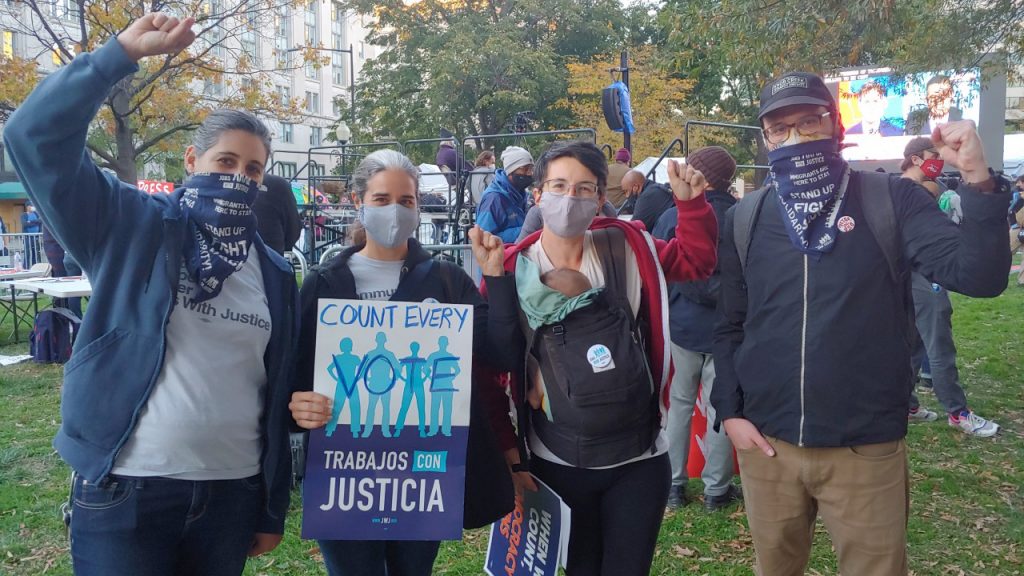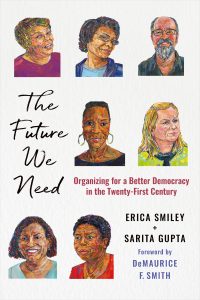New book explores the future of collective bargaining
In The Future We Need, Erica Smiley and Sarita Gupta bring a novel perspective to building worker power, suggesting ways to evolve collective bargaining to match the needs of modern people — not only changing their wages and working conditions, but being able to govern over more aspects of their lives.

Photo credit: Jobs for Justice
There’s a resurgence of interest in workers unions happening across the U.S. in the wake of the pandemic. Employees at companies from Starbucks to Kellogg to Amazon and more are trying to flex their collective power by forming unions or renegotiating better contracts for workers.

Erica Smiley is the executive director of Jobs with Justice and co-author with Sarita Gupta of The Future We Need: Organizing for a Better Democracy in the 21st Century. She says workers’ efforts nationwide to organize is inspiring and exciting. The fight at Amazon in particular is one Jobs with Justice has been paying attention to.
“We have a company that almost operates like a country in terms of how it controls different infrastructure and commerce across states,” Smiley says. “Many of the workers at Amazon aren’t just fighting for improved wages and conditions for themselves, but are really trying to hold the company accountable for their role in the economy, and perhaps for their role in helping to minimize or even decrease the significance and importance of democratic participation.”
Smiley says the pandemic is an unprecedented moment that played a significant role in the mass uprising of workers, but it was just one of several factors not just in the U.S. but worldwide. “If you are a Black worker in the in the U.S., you might be impacted by things that that others might just deem as civil rights. … Working people are experiencing all of these things as compounding issues,” says Smiley, pointing out that many people were categorized as essential workers and in essential sectors of the economy such as grocery stores, retail and transportation. These were historically jobs considered low wage or excluded from union protections.
“The fact that they were deemed essential gave a different kind of power and clarity to the role that they played in the economy. The economy needed many of these workers to survive,” Smiley says.

Workers had to keep working in unsafe conditions, raising the question of if they are essential, why aren’t they being taken care of like they are important when they are putting their lives at risk?
“What we’re seeing is that people have been fed up for a really long time, in some ways they’ve been disempowered, or at least separated from the power that they already have,” Smiley says.
In the book, Gupta and Smiley call on workers to recognize they have power. “They’ve always had it, the pandemic only exposed that they played an essential role in the economy. It’s not like it made them essential. And so now acting on that they can make different decisions and different choices about the role they want to want to play in identifying solutions for our shared future and our shared prosperity.”
In order to have a healthy democracy, Smiley says one of the big metrics is how well people are able to live and be successful. In this moment, we should be thinking of “essential workers as a way to expand the ability of the majority of people to make decisions in society.”
Smiley says community-driven strategies, or applying collective bargaining to other economic relationships, could be valuable in expanding democratic practice to bring people together.
“When we center working people’s identity beyond workers, but as people of color, as women, when we really think of workers as whole people, that it actually allows us to not only build power and allow workers to improve their own standards and conditions, but to actually create a path and a foundation for perhaps, for the first time, a real multiracial democracy in the U.S.”
Trusted, accurate, up-to-date.
WDET strives to make our journalism accessible to everyone. As a public media institution, we maintain our journalistic integrity through independent support from readers like you. If you value WDET as your source of news, music and conversation, please make a gift today.
